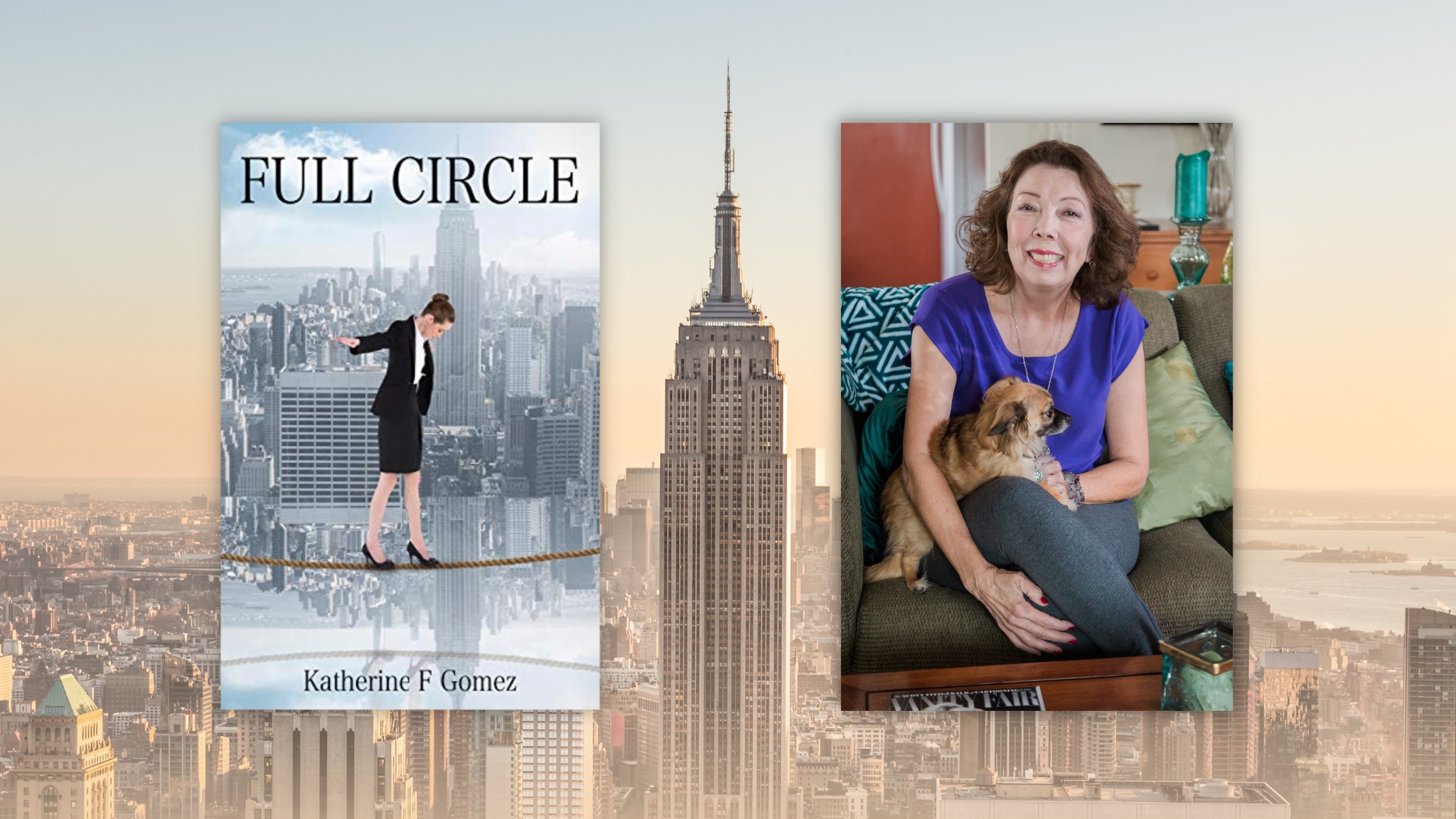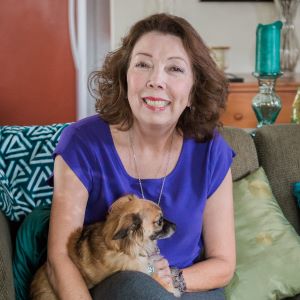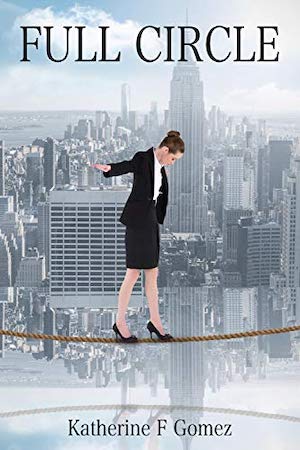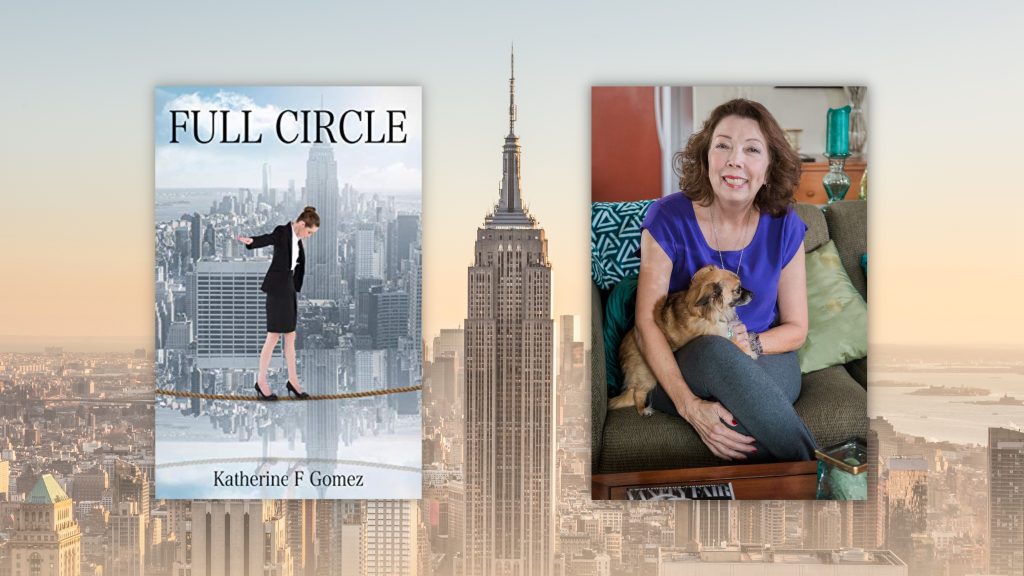
Full Circle by Katherine Gomez
In the 1980’s corporate world of Full Circle, Liz Castillo is a single professional woman trying to navigate the intricacies of a career-oriented life and what society deems is the role of womanhood. When it comes to the book’s discussion of the working woman’s struggles — everything from underpayment to sexual harassment — author Katherine Gomez has a knack for balancing serious topics with wisdom and wry humor. It seems that while Full Circle isn’t exactly a memoir, Gomez’s own time in the workplace was excellent inspiration for her story.
Check out our Q&A below to hear more about the author’s experiences, what made it into the story and what ended up on the cutting room floor.
Q: What inspired you to write this book?
A: After 30 years working in corporate America, I retired. The transition was not an easy one. But looking back on those years, I saw that I had lived during a period of profound changes in American history. I considered writing a memoir but quickly realized that I wanted more creative license than that would allow. I decided on experience-based literary fiction. Also, I needed a challenge that would result in my feeling productive again. Hence, the book.
Q: You describe Liz (the protagonist) as “an independent and ambitious young woman whose dreams conflicted with most of the things her parents wanted for her.” Where did you find inspiration for this character?
A: I was an only child for more than four years and my mother spent time reading to me nearly every day. But when two more babies arrived in fewer than two years, everything in my parents’ lives changed and I lost my place in the spotlight. I continued to read and began to form beliefs of my own. Liz’s character took on a lot of my own reactions to my perceived abandonment. She developed big dreams and the determination to make them her reality.
Q: I see that, after graduate school, you spent decades rising through the ranks at a global, NYC advertising agency, similar to Liz. How did your experiences influence this story?
A: Throughout my career, my experiences changed, influencing the good, bad and ugly stories found in the storyline. In the early days, the agency business was perceived as glamorous, largely due to its compensation practices. It was great fun to write that part of the book and I believe it shows in the writing. But the thrill of those times for agency was not sustainable. And once billable hours found their way into ad agencies, the feeling of “the day the music died” was palpable.
Q: This seems like a story with themes that might hit close to home? What was that writing process like?
A: From the beginning of the process, it was important to me that this book be authentic. On the other hand, it could not be my story. As I began to write, I started to think not “what did Katherine do, but what would Liz do?” And the stories told in dialogue were either told to me by friends and highly embellished by me or created entirely by me. It was hard and often painful to write Liz’s story because it was close enough to mine to bring back memories. It was also cathartic. When readers told me they “cried for happy” at the end, I felt very grateful.
Q: This story isn’t just commentary on women’s issues it contains aspects of comedy, drama and heartbreaking emotions. What was the process like combining all these aspects?
A: I structured the book with three parts, which made the mood-blending easier for me. Life is filled with comedy, drama and heartbreaking emotions, and it had to be true for both Liz and my other characters.
Q: Your story takes place during a time when professional women believed they could “have it all” what do you think of that notion?
A: My beliefs have changed. In the beginning, I drank the Kool-Aid. At this point, I think it was and is unrealistic for most women to be Super Mom and successful CEOs at the same time.
Q: How do you think things have changed for women since the setting of this story?
A: I don’t think enough time has passed to answer this question with certainty. When I started at the agency, there were only two women running departments, one in HR and one in Research. There were also a few woman writers and art directors who had lived through the “Mad Men,” era and gradually found their way to real careers. But in my time, the people who made the decisions and all the Creative Directors were men.
Certainly, more women have now found their way into c-suites and in medical, political, scientific and other workplaces traditionally dominated by men. And although men who have traded sexual favors are now being held accountable, the practice still goes on. And changes women who fought successfully to get changed are now being challenged and even recanted. Your question about change has been politicized to the point where it is a slippery slope.
Q: You focus a lot on the issues facing women during this time period, yet Liz is also a character of mixed-Latinx heritage. what role, if any, does her ethnicity play in the story?
A: Liz’s ethnicity was not an issue in this story. It is important, but this is a story about women, not race. Although I too am of mixed ethnicity, I can’t speak for other women in answering this, especially women of color, because I look white. On the few occasions when people inquired whether my last name was acquired through marriage, I would simply answer that it was acquired because it was my father’s name.
Q: What do you hope readers will take away from this story?
A: I hope readers will understand the importance of girls and women learning the difference between needing and wanting, when to be persistent, and when flexibility would be better. They should think about how easy it is to fall in love and understand that committing to and sustaining a loving relationship can often be difficult, but in the long run, much more valuable.
Or, in the words of Mick Jagger and the Rolling Stones,* You can’t always get what you want, but if you try sometimes, you get what you need.
*If you don’t recognize this name, you may enjoy googling it.
 Katherine F. Gomez won her first prize for writing at age 17 and has been writing ever since. She has a degree in Comparative Literature U.C. Berkeley as well as an MBA from the Haas School there. After graduate school, Katherine spent decades at a global, NYC advertising agency, eventually rising to Senior Partner.
Katherine F. Gomez won her first prize for writing at age 17 and has been writing ever since. She has a degree in Comparative Literature U.C. Berkeley as well as an MBA from the Haas School there. After graduate school, Katherine spent decades at a global, NYC advertising agency, eventually rising to Senior Partner.
For the last ten years of her career, she was Senior Editorial Director for a national organization that raises funds for cancer research. Her responsibilities included writing fundraising and corporate materials for the organization’s television and print advertising, direct mail, and web marketing efforts.
She now lives and writes fiction in the California Wine Country.

Publish Date: February 11, 2022
Genre: Fiction
Author: Katherine Gomez
Page Count: 259 pages
ISBN: 9798412617640

